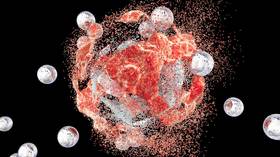‘Trojan horse’ treatment makes cancer self-destruct without use of drugs

A new experimental treatment reportedly tricks cancer cells into self-destructing, without the use of any drugs, providing new hope for winning the war on many different types of the disease.
The treatment involves a nanoparticle coated in an amino acid called L-phenylalanine. The chemical is not naturally produced in the body but is instead absorbed from meat and dairy produce that humans consume.
L-phenylalanine is the perfect bait as it is one of the main amino acids cancer cells require to grow and spread throughout the human body, wreaking havoc in the process.
#NTUsg scientists have devised a ‘Trojan horse’ approach to kill #cancer cells without drugs by coating a nanoparticle with amino acid L-phenylalanine that causes cancerous cells to self-destruct. https://t.co/Q0CbhBVFrRpic.twitter.com/36EDsGXEk0
— NTU Singapore (@NTUsg) September 24, 2020
The novel new treatment has proven incredibly successful on mice. The secret is the nanoparticle Nanoscopic phenylalanine Porous Amino Acid Mimic, or Nano-pPAAM for short.
Nano-pPAAM triggers overproduction of reactive oxygen species (ROS) which causes a cascade effect inside the cancer cells, killing them while leaving surrounding, healthy cells unharmed.
“Against conventional wisdom, our approach involved using the nanomaterial as a drug instead [of] as a drug-carrier,” says material scientist Dalton Tay from Nanyang Technological University in Singapore.
Also on rt.com UK cancer charities warn of almost 50% Covid-induced drop in funding, but scientists worry virus itself may cause more tumorsThe method kills roughly 80 percent of breast, skin, and gastric cancer cells in mice, on par with leading chemotherapy treatments but without the nasty side effects. Research into nanoparticles typically focuses on using them as a delivery mechanism for drugs, not as the treatment itself.
There is still a long series of regulatory hurdles to surpass before the treatment will be available for human patients, however.
If it passes muster in clinical trials it will also help combat drug-resistant, recurring forms of cancer as well, providing yet another possible beacon of hope; without drugs to fight against, the cancer won’t have anything to resist.
Also on rt.com Surprise discovery: Joint Russian/American Covid-19 research leads instead to breakthrough in children’s cancer treatmentThink your friends would be interested? Share this story!













